-
Chicago Cataract Surgeon and Ophthalmologist, Dr. Craig Gerstein opens state-of-the-art office-based surgery in Chicago.
Chicago’s only destination for office-based cataract surgery offers a premium, hassle-free patient experience.
Chicago, IL, July 25, 2025 – Gerstein Eye Institute, the Chicago premier vision correction specialists, now offers office-based cataract surgery in a state-of-the-art iOR® surgery suite. The in-office surgery suite offers patients a reimagined surgical experience without the hassle of a traditional surgery center. Patients can expect a superior experience with more personalized and streamlined care in one convenient location, from initial consultation through post-surgical care.
“By performing surgery in our office, we can provide the most personalized and efficient surgical experience while utilizing the highest level of safety,” says Dr. Craig Gerstein of Gerstein Eye Institute. “Our in-office surgical suite provides a comforting environment with a staff that patients already know and trust. Office-based surgery is a new era of surgery that embraces patients’ well-being and peace of mind. I’m proud to offer this service in the Chicagoland area.”
Why Office-Based Cataract Surgery is Evolving as the New Standard of Care
Fifty years ago, ophthalmic procedures began shifting from hospitals to outpatient ambulatory surgery centers (ASC) as a convenient, safe, and more cost-effective option. We are on the brink of the next cosmic shift in cataract surgery, the transition to office-based surgery – a better solution for patients, doctors, and the healthcare system at large. By providing surgery in our office, we can provide greater access to eyecare with more scheduling availability, efficiency, and convenience for patients.
Patient Benefits:
– Highest safety standards
– Cost-effective
– More convenient access
– Ophthalmic-specialized staff
– Reduced stress & anxiety
– IV-free surgery with no fasting
– Shorter surgery and recovery time
– Overall higher satisfaction
Are you a candidate for office-based cataract surgery? Do you want to learn more? Contact Gerstein Eye Institute today at 773-973-3223 to schedule your consultation. Most major insurances are accepted. For more information visit www.gersteineye.com .
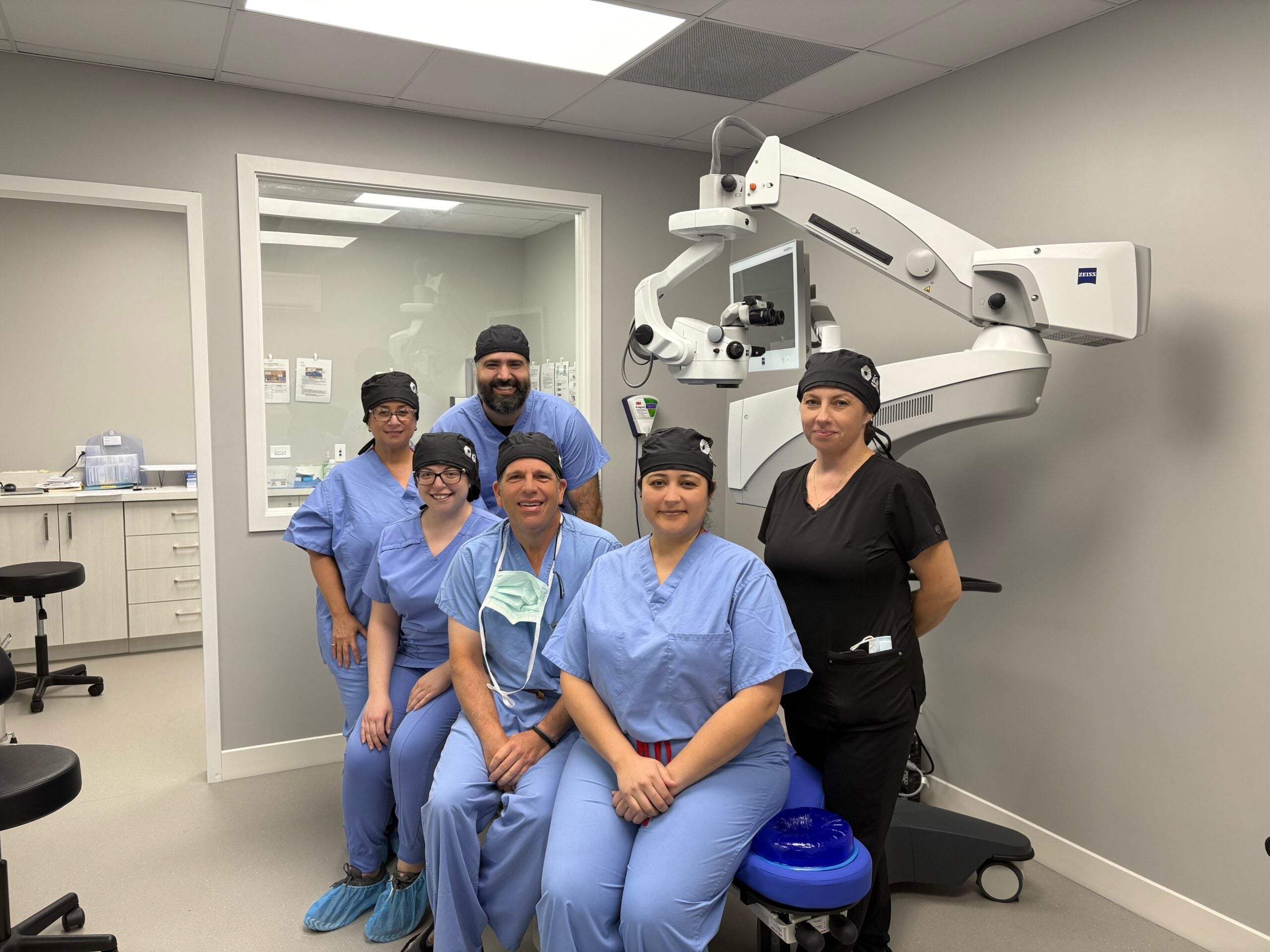
Gerstein Eye Institute Office-based cataract surgery- Meet your team!
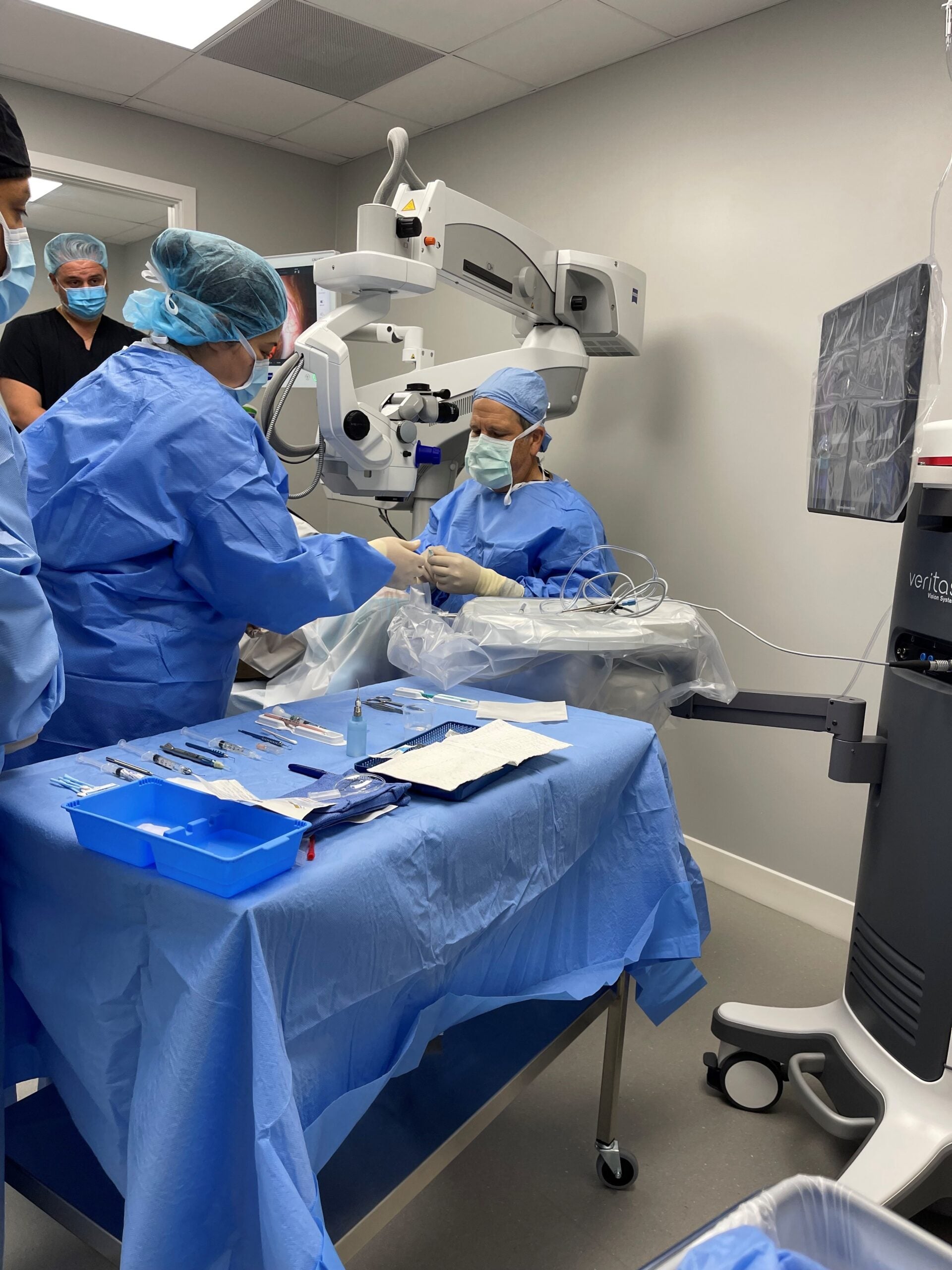
Gerstein Eye Institute Office-based cataract surgery- Chicago Cataract Surgeon, Craig H. Gerstein, M.D.
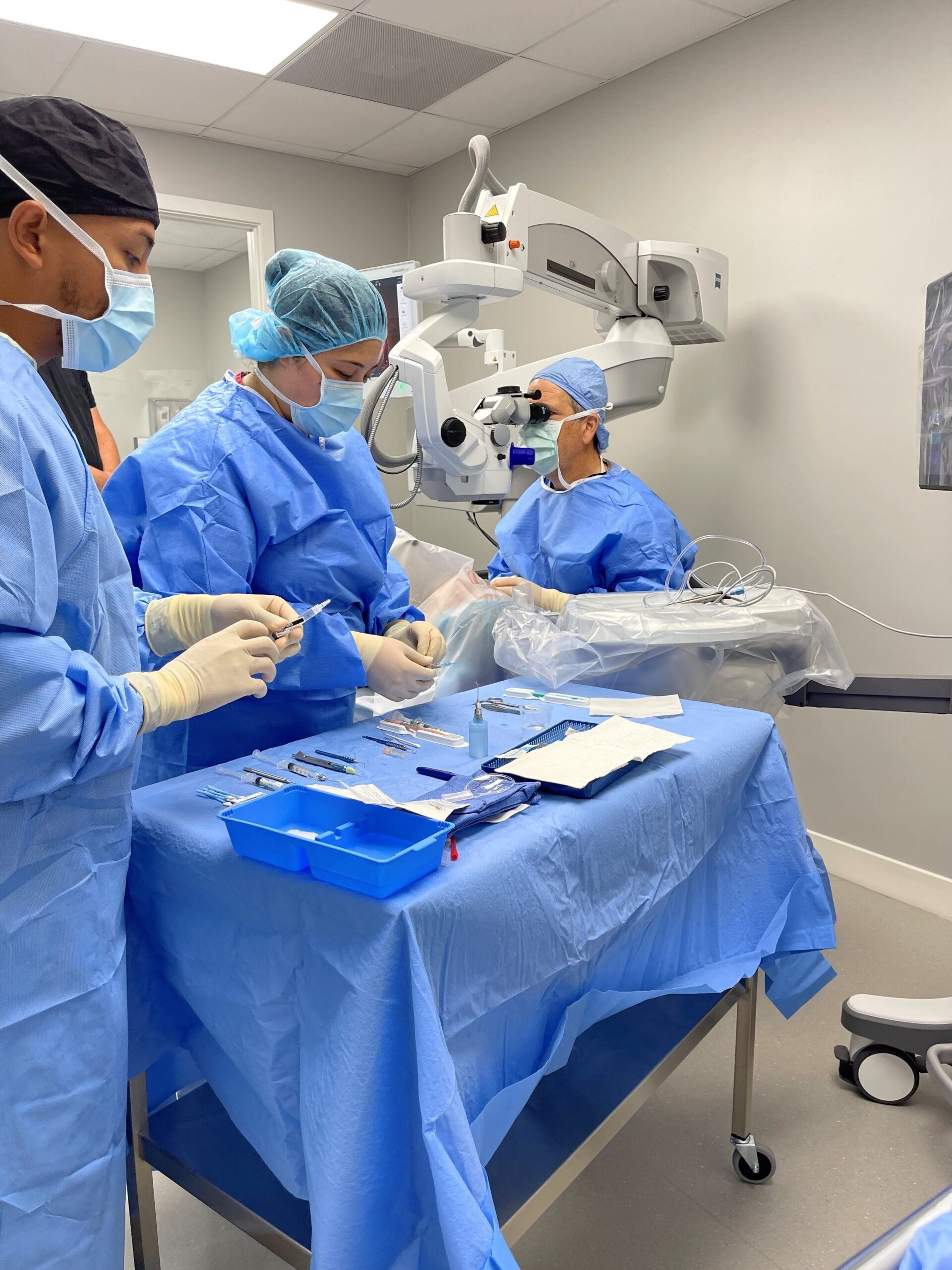
Gerstein Eye Institute Office-based cataract surgery- Chicago Cataract Surgeon, Craig H. Gerstein, M.D.
-
How Cataracts Affect Your Vision
A cataract is a clouding of the lens that can cause blurry vision. This condition is commonly related to age, but it can happen earlier in life. If your eye doctor tells you that you have cataracts, you might need surgery in order to correct them.
In a healthy eye, the lens is clear and helps focus light so you can see properly. The lens is made of water and protein. With age, the proteins start to clump together to cause cataracts. Check out this video to learn more about the eye and cataracts.
If you do have cataracts, it is important to find a quality eye doctor in Chicago who can help you find the right treatment. With custom cataract surgery, your doctor can remove the cloudy lens and fit you with an intraocular lens that restores your vision.
-
Choosing Protective Sunglasses
You probably know that the sun’s rays can damage your skin and even lead to skin cancer, but did you know that exposure to UV rays can also be dangerous for your eyes? Watch this video to learn why you should choose protective sunglasses from a vision center near Chicago .
When you reach for your sunscreen to lather up before you go outside, don’t forget to grab a pair of sunglasses at the same time. Choose a pair that blocks at least 99% of UVA and UVB rays to give yourself the most protection. If you need new glasses, be sure to look for a sticker that rates the shades’ UV protection level before you buy them. Remember to look for a pair that you will enjoy wearing—protecting yourself from the harmful rays of the sun can be fashionable as well as practical! For additional sun protection, grab a wide-brimmed hat to shade your eyes, face, and neck so you can enjoy the outdoors safely.
-
An Overview of LASIK Eye Surgery
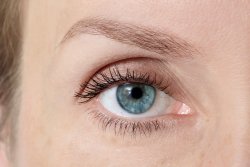 If you wear glasses or contact lenses, LASIK eye surgery could fix your vision issues to free you from the burden of corrective lenses. Keep reading for an overview of the procedure and how it can help you break away from the restraints of a life with glasses or contacts.
If you wear glasses or contact lenses, LASIK eye surgery could fix your vision issues to free you from the burden of corrective lenses. Keep reading for an overview of the procedure and how it can help you break away from the restraints of a life with glasses or contacts.It Treats Refractive Errors
Most people who need corrective lenses have refractive issues that prevent light from reaching the cornea in the proper way. Refractive errors include nearsightedness, or myopia, farsightedness or hyperopia, presbyopia, and astigmatism. If you suffer from any of these issues, you should get a LASIK consultation near Chicago to see if this form of eye laser surgery can improve your vision.
It Uses a Laser to Reshape the Cornea
If you and your ophthalmologist decide that this is the right procedure for you, he or she will use a revolutionary laser to cut a small flap on the cornea. The ophthalmologist then sculpts the corneal tissue with a laser so light hits it the right way. Once this step is complete, the doctor can replace the flap. The LASIK eye surgery is a fast procedure that effectively corrects your refractive issues so you can have better vision.
It Has a Quick Recovery Time
Most patients heal quickly after their LASIK procedures. Your ophthalmologist will send you home with a prescription for eye drops that prevent your eyes from getting infected. You might experience hazy vision for a day or so, but you should enjoy improved vision within a few days after the procedure. After a follow-up visit with your ophthalmologist, you should schedule visits every six months to ensure your vision is doing well.
If you are interested in improving your refractive issues, you should schedule an appointment for an eye exam. After a thorough examination, the eye doctor can tell you if this surgery is the right treatment option for your vision issues or if you need to go with another option.
-
Benefits of Intraocular Lenses
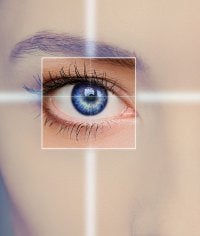 If you are one of the many people who rely on glasses or contact lenses in order to see clearly, you may have resigned yourself to the fact that you will always need these assistive aids. You may have even asked your eye doctor in Chicago about LASIK eye surgery, only to be told that you aren’t a good candidate for the procedure. If you are nearsighted, you may have another option. Intraocular contact lenses (ICL) work with the eye’s natural lens to improve vision without the hassle of glasses or external contact lenses. Visian ICL offers predictable and stable results, with an excellent quality of vision following the procedure. The implantation itself is relatively simple, as the lens is inserted through a very small incision. You won’t be able to see the lens once it’s implanted, and you won’t have to do anything to maintain it. Whether your myopia is mild or severe, ICL may be an option for you. Though removal shouldn’t be necessary, intraocular contact lenses are removable if the need should arise in the future.
If you are one of the many people who rely on glasses or contact lenses in order to see clearly, you may have resigned yourself to the fact that you will always need these assistive aids. You may have even asked your eye doctor in Chicago about LASIK eye surgery, only to be told that you aren’t a good candidate for the procedure. If you are nearsighted, you may have another option. Intraocular contact lenses (ICL) work with the eye’s natural lens to improve vision without the hassle of glasses or external contact lenses. Visian ICL offers predictable and stable results, with an excellent quality of vision following the procedure. The implantation itself is relatively simple, as the lens is inserted through a very small incision. You won’t be able to see the lens once it’s implanted, and you won’t have to do anything to maintain it. Whether your myopia is mild or severe, ICL may be an option for you. Though removal shouldn’t be necessary, intraocular contact lenses are removable if the need should arise in the future. -
Adult Risk Factors for Cataracts
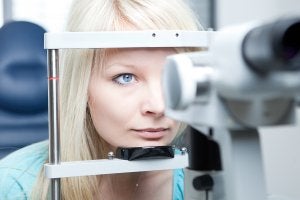 It’s easy to take your good vision for granted, but if something should go wrong, it could change your entire life. If you have not visited an eye doctor in Chicago recently, it’s time to make an appointment. Your eye doctor can spot potential vision problems before you even notice that something is wrong. Cataracts are a common condition that tend to affect older adults, and can lead to blurry, tinted vision. If your cataracts become severe, you may need to consult a custom cataract surgeon in order to restore your vision. Read on to learn about the risk factors for cataracts.
It’s easy to take your good vision for granted, but if something should go wrong, it could change your entire life. If you have not visited an eye doctor in Chicago recently, it’s time to make an appointment. Your eye doctor can spot potential vision problems before you even notice that something is wrong. Cataracts are a common condition that tend to affect older adults, and can lead to blurry, tinted vision. If your cataracts become severe, you may need to consult a custom cataract surgeon in order to restore your vision. Read on to learn about the risk factors for cataracts.Age
Aging is a part of life, but it can bring changes in your health that you may not be prepared for. Cataracts tend to affect people over the age of 60, though there are people who develop cataracts during middle age. Approximately half of adults over the age of 75 have cataracts and may need eye surgery to correct them. Normal proteins inside your eye’s lens can clump together as time goes on, which is what creates the cloudy effect in your vision.
Demographics
In general, women tend to have a higher risk of developing cataracts than men. Like many medical conditions, cataracts can be hereditary, so it’s a good idea to know your family history and find out if any of your relatives experienced them. Individuals of certain ethnicities may also be at a higher risk for cataracts, specifically African Americans and Hispanic Americans.
Medical Conditions
High blood sugar levels can contribute to the development of cataracts, which is one of the reasons why people with diabetes have a higher risk of developing them. In addition, individuals with diabetes are more likely to develop cataracts when they are younger than those without the disease. People with autoimmune diseases such as rheumatoid arthritis, lupus, and multiple sclerosis may also be at a higher risk of developing cataracts because of steroid medications they may need to take frequently. Be sure to tell your eye doctor about your complete medical history during your next eye exam.
-
What are cataracts?
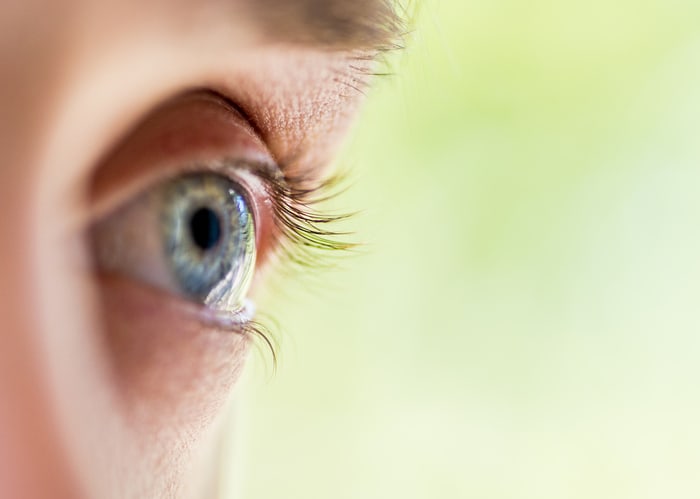
How much do you know about cataracts? Cataracts are extremely common, affecting more than 20.5 million Americans over the age of 40. In fact, by age 65, it’s estimated that more than 90% of people in the United States will develop cataracts, and by the time they’re 75, those cataracts will have a major impact on their vision. Knowing those statistics, it’s a good idea to know a little bit about cataracts.
- What is a cataract? Typically found in people over age 55, a cataract is an opaque or cloudy area in the lens of the eye. Cataracts can be found in one or both eyes, but don’t spread from one eye to the other. They interfere with vision because they cause the light entering the eye to be scattered, rather than properly focused.
- What are the symptoms of cataracts? Cataracts form slowly and cause blurred or hazy vision, reduced intensity of colors, increased sensitivity to glare, and increased difficulty seeing at night.
- Are there different types of cataracts? Nuclear cataracts are located in the center of the iris, while cortical cataracts affect the layer of the lens that surrounds the nucleus, and posterior cataracts are on the back outer layer of the lens. Posterior cataracts develop most rapidly.
- How can cataracts be prevented? You can’t really prevent cataracts, but you can reduce your risk of developing cataracts by eating a nutrient-dense diet, not smoking, and keeping diabetes under control. Limiting alcohol consumption, protecting your eyes from the sun, and seeing your eye doctor regularly are also good steps toward cataract prevention.
- What’s the best treatment for cataracts? If a cataract doesn’t affect your vision, it may not require treatment. Even if it does, you can often just treat the symptoms of a cataract, by wearing eyeglasses, using brighter lighting, wearing anti-glare sunglasses, or using magnifying lenses. The only way to treat a cataract itself, though, is through surgery.
- What’s involved in cataract surgery? Cataract surgery involves removing the cloudy lens and replacing it with an artificial one. Cataract surgery is one of the most common, and safest, surgeries performed in the United States. Your eye doctor will be able to help you determine whether it’s right for you.
If you are looking for an eye doctor, the Gerstein Eye Institute in Chicago can help. Since 1968, the Gerstein Eye Institute has been providing exceptional ophthalmologic care to patients in the Chicago area. With decades of experience in ophthalmology, our certified professional staff members have together performed over 30,000 procedures. To schedule a consultation, call us at 773.596.9545 or contact us through our website.
-
How Often Should You Get Your Eyes Checked?

When it comes to your health, prevention is the best medicine. That’s why regular eye doctor visits are invaluable for maintaining your vision. When you get your eyes checked, the ophthalmologist makes sure your prescription hasn’t changed and tests for various conditions that could affect your eyesight. When caught and treated early, it’s possible to keep your vision crisp and clear.
The question many people have is how often should you get your eyes checked? Consider these recommendations.
Vision Correction Eye Exam
If you wear glasses or contact lenses, you should visit the eye doctor for a vision checkup every one to two years. Your prescription expires after this length of time, so it’s important to make sure your eyes haven’t changed before you buy new glasses or order more contacts.
Comprehensive Dilated Eye Exam
During more thorough eye exams, the ophthalmologist administers special eye drops that make your pupils dilate, or open wide so the doctor can take a closer look at the inside of your eyes. This is useful for detecting eye diseases such as glaucoma, cataracts and macular degeneration.
Preventblindness.org advises having a comprehensive eye exam as often as recommended by your eye doctor. Here are the general guidelines for how frequently you should have comprehensive dilated eye exams:
- 20 to 39 years old: Schedule a dilated eye exam every two to four years if you’re African-American, or every three to five years if you’re Caucasian.
- 40 to 64 years old: Schedule a dilated eye exam every two to four years.
- 65 years and older: Schedule a dilated eye exam every one to two years.
- People with special needs: If you’re at risk for eye problems because you have diabetes, a previous eye trauma or surgery, or family history of eye disease, talk to your eye doctor about how often you should get your eyes checked.
Signs You Should Schedule an Eye Exam
Having a vision checkup once a year and following the above-recommended schedule for comprehensive dilated eye exams should keep your vision in good shape. However, if you experience symptoms of eye trouble, you should visit an ophthalmologist right away, no matter when your last eye exam was. Here are the signs you should schedule an eye exam:
- Your eyes are itchy, red and dry.
- You see spots, excessive floaters or flashes of light.
- You have difficulty reading street signs while driving at night.
- You get headaches or experience blurred vision or eye strain after working at a computer for a long time.
- You have trouble following moving targets or get dizzy and nauseated when you try.
- You have to squint to read books or newspapers up close.
- You notice sudden changes in your vision, especially after experiencing head
- You can’t remember the last time you had an eye exam.
Get your eyes checked today – call Gerstein Eye Institute in Chicago, IL at 773.596.9545 to schedule your next appointment!
-
What Are Cataracts?
Cataracts are quite common in older people, but if you haven’t experienced them you may not know much about what they are. A cataract is a clouding of the eye lens that negatively affects your vision. By the age of 80, at least half of the population will have a cataract or have undergone cataract surgery.

Cataracts can happen in both of your eyes or in just one of them. If you’re experiencing any of the following symptoms you may have a cataract:
- Blurred vision
- Faded colors
- Glare from sunlight, headlights, etc. or a halo around lights
- Difficult seeing at night
- Double vision
- Frequent changes in prescription for eyewear
Cataracts typically develop slowly and at first they can be helped by getting new glasses, using anti-glare sunglasses or magnifying lenses, and using brighter lighting. If you haven’t experienced a cataract, it can be compared to looking through a foggy or frosty window.
If you notice any of the previously mentioned symptoms, you should make an appointment for an eye exam. See your doctor right away if you experience sudden eye pain, sudden vision changes, or sudden headaches.
If you haven’t experienced cataracts, it might not be too late to help prevent them from forming. Regular eye examinations can lead to early detection of cataracts. Unhealthy activities like smoking or drinking too much can increase your risk of cataracts. Managing health conditions like diabetes and eating fruits and vegetables with antioxidants can also help prevent cataracts.
Cataract surgery is very common and is a relatively simple and painless procedure to help regain vision. More than three million Americans undergo the procedure each year and 90% of them regain very good vision, from 20/20 to 20/40. You will likely still need reading glasses and may require progressive lenses.
To learn more or schedule an appointment with Gerstein Eye Institute, give us a call today at 773-596-9545.
-
The Benefits of LASIK
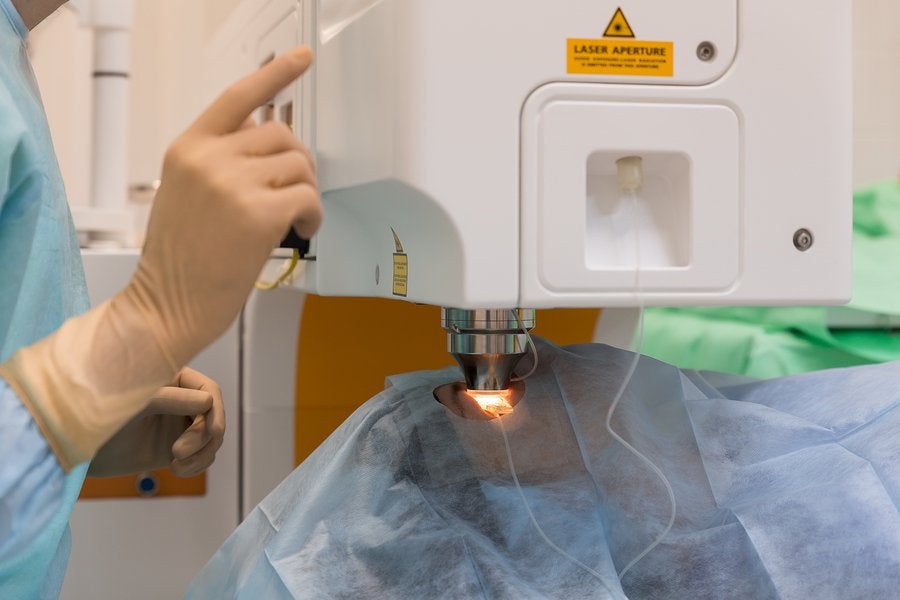
LASIK is still the most common laser eye surgery in the United States. The procedure can be completed with a laser or a blade and creates a thin flap in the cornea. The cornea is reshaped to correct the refractive error and improve vision.
Laser eye surgery was first available in the 1980s and by 2001 LASIK was the most common elective surgery in the world. LASIK is considered a third option in addition to wearing eyeglasses or contact lenses.
There are several benefits of having LASIK performed, and the most obvious is having your vision improved without having to wear glasses or contacts. After LASIK surgery, your vision will improve immediately, and it may continue to improve for a year.
LASIK eye surgery can be performed in both eyes on the same day and you’ll likely be able to get back to work in just a day or two. LASIK is a viable option for about 80% of the adult population. If you’re 18 or older, have a common vision problem such as far or nearsightedness or astigmatism, lead an active lifestyle, are in general good health, and cannot or would prefer not to wear glasses or contacts, LASIK could be right for you.
More Benefits of LASIK
- The safety of LASIK eye surgery has increased over the years
- Typically causes little to no pain
- Vision is corrected almost immediately or at least by the day after the procedure
- Quick recovery
- Adjustments can be made for years
- Most patients will no longer need corrective eyewear
- You’ll actually save money over the years on frames and lenses or contacts and contact solution as well as ophthalmologist appointments
- Improved self-confidence
- Can participate in activities such as swimming or surfing without worrying about eyewear
- Reduced allergy symptoms compared to wearing contacts
To schedule an appointment with Gerstein Eye Institute, call 773-596-9545.
